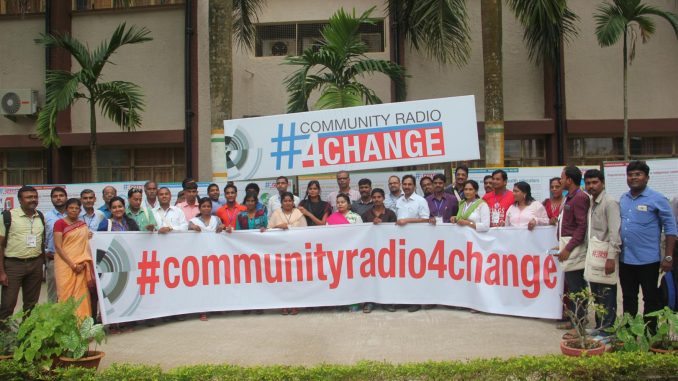
By Andaz Aaron
Bhubaneswar : “Community Radio has been one of the very effective medium of reaching out to the most marginalized and remote communities whose voice has not been heard. Also it is one of the effective means of making the voice of the community heard and collectivizing people around the issue that affect most”, echoed the participants in the National Consultation on ‘Community Radio: Furthering Rights, Justice and Development of Marginalized Communities’. The 2-day consultation held at National Academy of Broadcasting & Multimedia, Bhubaneswar was organized by Young India & ActionAid India on 2nd & 3rd August 2017.
 41 Community Radio broadcasters from 19 states of India participated in the consultation and contributed to the discussion through sharing their experiences, learning, best practices and perspectives that has been developed working with the community. An exhibition of best practices by the community radio centers across India was also opened to the public for dissemination. Besides that a booklet was released with the best practices of community radios including views & suggestions from the community, CRs as well as CSOs.
41 Community Radio broadcasters from 19 states of India participated in the consultation and contributed to the discussion through sharing their experiences, learning, best practices and perspectives that has been developed working with the community. An exhibition of best practices by the community radio centers across India was also opened to the public for dissemination. Besides that a booklet was released with the best practices of community radios including views & suggestions from the community, CRs as well as CSOs.
“The role of community radio has been noteworthy in bringing change through connecting people with information on their rights and entitlements. Despite the globalization of media along with easy access to internet connectivity throughout, community radio is still seen as an effective medium to reach out the communities in rural India” mentioned Prof. Vinod Paverela, Chair at UNESCO Chair on Community Media.
Since the community radio is evolved from community hence it has become an effective and empowering tool for addressing the issues of community through advocating for rights of women, minorities & dalit communities, building the community resilient to disaster, grounding of secular values of the constitutions and building strong understanding between the people in conflicts and mobilizing solidarity support of different social groups, and CSOs for ensuring social justice to the vulnerable communities.
As of now, 201 Community Radio Stations have become operational in the country, out of which 76 are operated by NGOs, 110 by the Educational Institutions and 15 by State Agricultural Universities/ Krishi Vigyan Kendras.
“The consultation is to discuss the capacity of Community Radio in bringing social change across the country and creating a plan on how to make use of the network of community radio towards ensuring peace & justice, building a disaster resilient community” said N A Shah Ansari, President, Young India and the Chairperson, Radio Namaskar, a vibrant community radio operational in coastal Odisha for more than a decade.
Dr. Shahid Rasool, Director, CEMCA also praised the pro-people activities by community radios in different parts of the country. He said Community Radio should not have fixed focus. It should aim to make listeners a learner. Be sensitive to the need of the hour for the community.
“Community Radio can be used to amplify the voice of poor and marginalized to access their rights and entitlements” opined Sehjo Singh, Director Programme & Policies, ActionAid.
On the second day of the National Level Consultation, noted bureaucrats, media personalities and social activists joined in the call that ‘Community Radio needs volunteers and community participation in order to bring in sustainable practices’.
Odisha State Information Commissioner Sashiprava Bindhani praised the community radio for spreading vital information to the far flung areas.
“We need to work together to bring community radio to an empowering level and our organisation will always be here to help you out” said Sandeep Chachra, Executive Director, Action Aid India.
Deepak Samantaray, Director, National Academy of Broadcasting and Multimedia, said that the communities need to be involved to the fullest and we should create a space of our own to attract the audience to our community radio channels.
Among others, Dr. S. Rasool, Director, Commonwealth Educational Media Centre for Asia, Mrinal Chatterjee, Director IIMC, Kumar Kalanand Mani, Executive Secretary, Peaceful Society, Goa and Debabrat Patra, Regional Manager, ActionAid, Sandeep Sahu, Senior Journalist, BBC, Mrinal Chatterjee, Director, IIMC, Dhenkanal, Jatindra Dash, Senior Journalist, Thomson Reuters, Ms. Manipadma Jena, Senior Journalist, Sanjoy Patnaik, Director, Centre for Rights & Resources, Dr. Gaurav, Director, RMNH, Prof. Srijit Mishra, Director, NCDS, Animesh Prakash, Program Officer, OXFAM, Prof. DV Ramana, XIMB, Prof. Anup Das and Joseph Mathai, Senior Manager, Communication, ActionAId, BN Durga, Programme Officer, ActionAid , Ghasiram panda, Programme Manager, ActionAid graced the consultation.



Leave a Reply